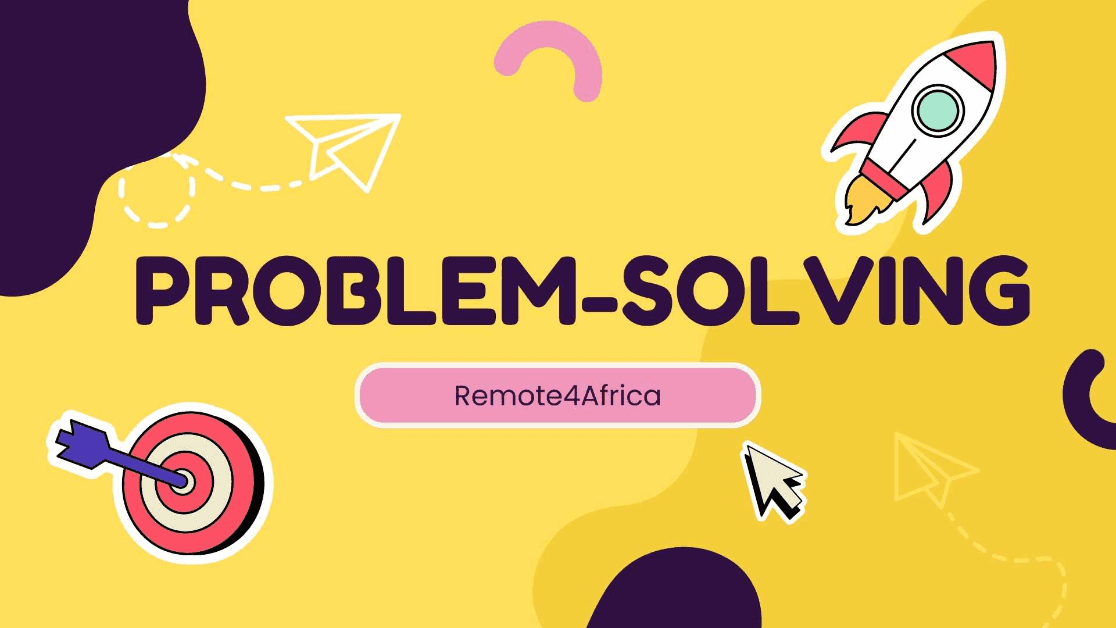Posted on Aug 14
Problem-solving is a fundamental skill that involves finding solutions to challenges or difficulties that you encounter in various situations. It's like being a detective, but instead of solving mysteries, you're figuring out how to overcome obstacles or make things better.
Imagine you're putting together a puzzle, but some of the pieces are missing. Problem-solving is like trying to find those missing pieces. It's about using your thinking and creativity to find ways to fix things when they don't go as planned or when you face something tricky. Just like when you solve a puzzle, you might need to try different approaches, think carefully, and use what you know to come up with a solution. Problem-solving helps you become better at figuring things out and making things work, even when they seem a bit confusing at first.
1. Understand the Problem:
Begin by clearly understanding the problem you're facing. Define what needs to be solved and identify any constraints or limitations.
Break down the problem into smaller parts to make it more manageable.
2. Gather Information:
Collect relevant information and facts about the problem. Research and gather data that might help you understand the root causes and potential solutions.
3. Brainstorm Solutions:
Generate a list of potential solutions, no matter how wild they may seem. Encourage creativity and think outside the box.
Don't worry about evaluating the ideas at this stage; focus on generating as many options as possible.
4. Evaluate Options:
Review the list of solutions you've generated. Consider the pros and cons of each option.
Assess the feasibility, potential outcomes, and impact of each solution on the problem.
5. Choose the Best Solution:
Based on your evaluation, select the solution that seems most promising and suitable for the situation.
Consider the practicality of implementing the solution and whether it aligns with your goals.
6. Develop an Action Plan:
Create a step-by-step plan for implementing the chosen solution. Outline the specific actions you need to take.
Identify any resources, tools, or assistance you might require.
7. Take Action:
Put your plan into action and start working on solving the problem.
Be flexible and adaptable as you navigate through the process.
8. Monitor Progress:
Keep track of your progress as you work towards solving the problem.
Make adjustments to your plan if needed, based on new information or unexpected challenges.
9. Reflect and Learn:
After implementing your solution, take some time to reflect on the process and outcome.
Consider what worked well and what could be improved for future problem-solving situations.
10. Practice Regularly:
Problem-solving is a skill that improves with practice. Challenge yourself with different types of problems to expand your abilities.
Engage in activities that require critical thinking and decision-making to hone your problem-solving skills.
11. Seek Feedback:
Don't hesitate to ask for feedback from others. Different perspectives can offer valuable insights and alternative viewpoints.
12. Learn from Mistakes:
Understand that not all solutions will work perfectly. If your chosen solution doesn't yield the expected results, analyze why and learn from the experience.
Online Learning Platforms: There's a wealth of online courses dedicated to problem-solving skills tailored for remote work. Platforms like Coursera, LinkedIn Learning, and Udemy offer courses ranging from communication strategies in virtual teams to innovative approaches to virtual collaboration.
Virtual Workshops and Webinars: Participating in virtual workshops can provide hands-on experience in applying problem-solving techniques to remote work scenarios. Look for workshops that focus on real-world challenges, such as remote project management or cross-cultural communication in virtual teams.
Case Studies and Role-Playing: Engage in case studies and role-playing exercises related to remote work challenges. These activities simulate real situations and encourage you to brainstorm solutions, fostering your ability to think on your feet.
Mentorship and Peer Learning: Connect with experienced remote professionals who can serve as mentors. Learning from their insights and experiences can provide you with practical strategies for overcoming remote work hurdles.
Project Management Software: Tools like Trello, Asana, and Monday.com aid remote teams in task management, collaboration, and tracking progress.
Virtual Whiteboards: Platforms like Miro and MURAL offer virtual whiteboards for brainstorming, mind mapping, and collaborative idea generation.
Communication Platforms: Apps such as Slack, Microsoft Teams, and Zoom facilitate seamless communication and video conferencing in remote teams.
Having strong problem-solving skills is especially valuable in the context of remote work, where adaptability, critical thinking, and self-direction are key to success. Remote work requires individuals to manage their tasks independently, overcome challenges, and contribute effectively to virtual teams. Here are some remote career prospects where problem-solving skills can greatly benefit individuals:
Remote Project Management:
Remote project managers are responsible for coordinating and overseeing various tasks, teams, and timelines. Problem-solving skills are essential for navigating obstacles, adapting to changes, and ensuring project goals are met.
Remote Software Development and IT:
Software developers and IT professionals often work remotely on coding, troubleshooting, and maintaining systems. Problem-solving skills are crucial for identifying and fixing technical issues, as well as for developing innovative solutions.
Remote Customer Support:
Remote customer support professionals assist customers with their inquiries, troubleshoot problems, and provide solutions. Effective problem-solving is vital for delivering excellent customer service and resolving issues remotely.
Remote Consulting and Freelancing:
Remote consultants and freelancers offer specialized expertise to clients. Problem-solving skills help them address client challenges, offer strategic advice, and deliver tangible results.
Remote Data Analysis and Research:
Professionals who analyze data remotely use problem-solving skills to interpret complex datasets, identify trends, and draw meaningful insights.
Remote Education and Training:
Remote educators and trainers create engaging online content, adapt to various learning needs, and troubleshoot technical challenges. Problem-solving skills enhance their ability to deliver effective virtual learning experiences.
Remote Content Creation and Digital Marketing:
Content creators and digital marketers develop strategies to engage online audiences and promote brands. Problem-solving skills are essential for adapting to changing trends and finding creative ways to capture attention.
Remote Entrepreneurship:
Entrepreneurs who work remotely must navigate challenges in business development, marketing, and operations. Problem-solving skills are crucial for identifying opportunities, mitigating risks, and building a successful remote business.
Remote Design and Creative Fields:
Designers and creatives working remotely use problem-solving skills to create visually appealing and functional designs that meet client needs.
Remote Healthcare and Telemedicine:
Remote healthcare professionals provide virtual consultations, diagnose conditions, and recommend treatments. Problem-solving skills are essential for accurate diagnosis and patient care from a distance.
Remote Sales and Business Development:
Remote sales professionals identify client needs, develop solutions, and close deals remotely. Problem-solving skills help them tailor their approach to different clients and industries.
Remote Project-based Work:
Remote workers often engage in short-term project-based work across various industries. Problem-solving skills enable them to quickly understand project requirements, contribute effectively, and deliver results.
Overall, problem-solving skills are highly adaptable and enhance remote professionals' ability to tackle challenges, communicate effectively, and thrive in a virtual work environment. Whether you're a remote employee, freelancer, consultant, or entrepreneur, these skills are essential for succeeding in the remote work landscape.
Remote work's dynamic nature demands a versatile skill set, and problem-solving skill is at the heart of it all. By understanding, learning, and honing this skill, you equip yourself to thrive in a remote work environment. Remember, each challenge you overcome strengthens your problem-solving prowess, making you a valuable asset to your remote team.
Problem-Solving Skill: How to Learn and Adapt to Remote Work

In the dynamic landscape of today's professional world, remote work has become not just a trend, but a necessity. The ability to solve problems effectively is a cornerstone of successful remote work, empowering individuals to navigate challenges, collaborate virtually, and contribute to the seamless functioning of remote teams.. In this article, we'll delve into the art of learning and enhancing problem-solving skills to adapt seamlessly to remote work challenges.
What is Problem Solving?
Problem-solving is a fundamental skill that involves finding solutions to challenges or difficulties that you encounter in various situations. It's like being a detective, but instead of solving mysteries, you're figuring out how to overcome obstacles or make things better.
Imagine you're putting together a puzzle, but some of the pieces are missing. Problem-solving is like trying to find those missing pieces. It's about using your thinking and creativity to find ways to fix things when they don't go as planned or when you face something tricky. Just like when you solve a puzzle, you might need to try different approaches, think carefully, and use what you know to come up with a solution. Problem-solving helps you become better at figuring things out and making things work, even when they seem a bit confusing at first.
How to Develop and Enhance Your Problem-Solving Skill
1. Understand the Problem:
Begin by clearly understanding the problem you're facing. Define what needs to be solved and identify any constraints or limitations.
Break down the problem into smaller parts to make it more manageable.
2. Gather Information:
Collect relevant information and facts about the problem. Research and gather data that might help you understand the root causes and potential solutions.
3. Brainstorm Solutions:
Generate a list of potential solutions, no matter how wild they may seem. Encourage creativity and think outside the box.
Don't worry about evaluating the ideas at this stage; focus on generating as many options as possible.
4. Evaluate Options:
Review the list of solutions you've generated. Consider the pros and cons of each option.
Assess the feasibility, potential outcomes, and impact of each solution on the problem.
5. Choose the Best Solution:
Based on your evaluation, select the solution that seems most promising and suitable for the situation.
Consider the practicality of implementing the solution and whether it aligns with your goals.
6. Develop an Action Plan:
Create a step-by-step plan for implementing the chosen solution. Outline the specific actions you need to take.
Identify any resources, tools, or assistance you might require.
7. Take Action:
Put your plan into action and start working on solving the problem.
Be flexible and adaptable as you navigate through the process.
8. Monitor Progress:
Keep track of your progress as you work towards solving the problem.
Make adjustments to your plan if needed, based on new information or unexpected challenges.
9. Reflect and Learn:
After implementing your solution, take some time to reflect on the process and outcome.
Consider what worked well and what could be improved for future problem-solving situations.
10. Practice Regularly:
Problem-solving is a skill that improves with practice. Challenge yourself with different types of problems to expand your abilities.
Engage in activities that require critical thinking and decision-making to hone your problem-solving skills.
11. Seek Feedback:
Don't hesitate to ask for feedback from others. Different perspectives can offer valuable insights and alternative viewpoints.
12. Learn from Mistakes:
Understand that not all solutions will work perfectly. If your chosen solution doesn't yield the expected results, analyze why and learn from the experience.
Strategies for Learning and Improving Problem-Solving Skills
Online Learning Platforms: There's a wealth of online courses dedicated to problem-solving skills tailored for remote work. Platforms like Coursera, LinkedIn Learning, and Udemy offer courses ranging from communication strategies in virtual teams to innovative approaches to virtual collaboration.
Virtual Workshops and Webinars: Participating in virtual workshops can provide hands-on experience in applying problem-solving techniques to remote work scenarios. Look for workshops that focus on real-world challenges, such as remote project management or cross-cultural communication in virtual teams.
Case Studies and Role-Playing: Engage in case studies and role-playing exercises related to remote work challenges. These activities simulate real situations and encourage you to brainstorm solutions, fostering your ability to think on your feet.
Mentorship and Peer Learning: Connect with experienced remote professionals who can serve as mentors. Learning from their insights and experiences can provide you with practical strategies for overcoming remote work hurdles.
Tools and Resources for Remote Problem Solving
Project Management Software: Tools like Trello, Asana, and Monday.com aid remote teams in task management, collaboration, and tracking progress.
Virtual Whiteboards: Platforms like Miro and MURAL offer virtual whiteboards for brainstorming, mind mapping, and collaborative idea generation.
Communication Platforms: Apps such as Slack, Microsoft Teams, and Zoom facilitate seamless communication and video conferencing in remote teams.
Careers Prospects for Problem-Solving Skills in Remote Work
Having strong problem-solving skills is especially valuable in the context of remote work, where adaptability, critical thinking, and self-direction are key to success. Remote work requires individuals to manage their tasks independently, overcome challenges, and contribute effectively to virtual teams. Here are some remote career prospects where problem-solving skills can greatly benefit individuals:
Remote Project Management:
Remote project managers are responsible for coordinating and overseeing various tasks, teams, and timelines. Problem-solving skills are essential for navigating obstacles, adapting to changes, and ensuring project goals are met.
Remote Software Development and IT:
Software developers and IT professionals often work remotely on coding, troubleshooting, and maintaining systems. Problem-solving skills are crucial for identifying and fixing technical issues, as well as for developing innovative solutions.
Remote Customer Support:
Remote customer support professionals assist customers with their inquiries, troubleshoot problems, and provide solutions. Effective problem-solving is vital for delivering excellent customer service and resolving issues remotely.
Remote Consulting and Freelancing:
Remote consultants and freelancers offer specialized expertise to clients. Problem-solving skills help them address client challenges, offer strategic advice, and deliver tangible results.
Remote Data Analysis and Research:
Professionals who analyze data remotely use problem-solving skills to interpret complex datasets, identify trends, and draw meaningful insights.
Remote Education and Training:
Remote educators and trainers create engaging online content, adapt to various learning needs, and troubleshoot technical challenges. Problem-solving skills enhance their ability to deliver effective virtual learning experiences.
Remote Content Creation and Digital Marketing:
Content creators and digital marketers develop strategies to engage online audiences and promote brands. Problem-solving skills are essential for adapting to changing trends and finding creative ways to capture attention.
Remote Entrepreneurship:
Entrepreneurs who work remotely must navigate challenges in business development, marketing, and operations. Problem-solving skills are crucial for identifying opportunities, mitigating risks, and building a successful remote business.
Remote Design and Creative Fields:
Designers and creatives working remotely use problem-solving skills to create visually appealing and functional designs that meet client needs.
Remote Healthcare and Telemedicine:
Remote healthcare professionals provide virtual consultations, diagnose conditions, and recommend treatments. Problem-solving skills are essential for accurate diagnosis and patient care from a distance.
Remote Sales and Business Development:
Remote sales professionals identify client needs, develop solutions, and close deals remotely. Problem-solving skills help them tailor their approach to different clients and industries.
Remote Project-based Work:
Remote workers often engage in short-term project-based work across various industries. Problem-solving skills enable them to quickly understand project requirements, contribute effectively, and deliver results.
Overall, problem-solving skills are highly adaptable and enhance remote professionals' ability to tackle challenges, communicate effectively, and thrive in a virtual work environment. Whether you're a remote employee, freelancer, consultant, or entrepreneur, these skills are essential for succeeding in the remote work landscape.
Remote work's dynamic nature demands a versatile skill set, and problem-solving skill is at the heart of it all. By understanding, learning, and honing this skill, you equip yourself to thrive in a remote work environment. Remember, each challenge you overcome strengthens your problem-solving prowess, making you a valuable asset to your remote team.
Related Resources



Webinars / Interviews
Apr 08
Getting Started in Customer Support with no Experience
In a recent interview, Sadiq Joy offered valuable insights for aspiring customer support speci

Webinars / Interviews
Apr 02
Expert Interview: Starting out as a Virtual Assistant
This interview explores virtual assistance as a career with Zainab, an experienced VA. We explore he

Guides
Nov 15
Acing Your Customer Success/Support Interviews: Top 100 Interview Questions (+ Answer Guides)
Customer support jobs are some of the most in-demand jobs in the world today. As businesses increasi